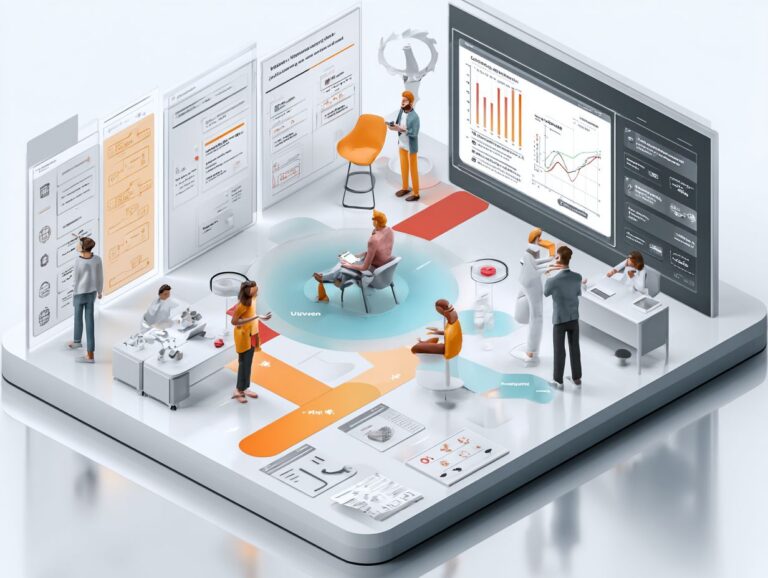CRM Integration: Data Security, Best Practices, and Compliance
In the current online environment, connecting CRM systems is important for protecting sensitive information and keeping customers’ trust. With venture capitalists increasingly focused on data security, businesses must prioritize best practices to mitigate risks. Companies like IBM are setting the standard for compliance, ensuring that sensitive information remains protected.
This article examines the details of CRM integration, discussing key strategies to improve data security and comply with industry regulations, helping your organization succeed in a competitive market.
Key Takeaways:
- Make sure CRM connections keep data safe by using encryption and controlling who can access it.
- Stay compliant with regulations such as GDPR and industry-specific requirements when integrating CRM systems.
- Pick the appropriate tools and regularly check and review to make sure CRM integration and data security practices work well.
- Data Security Challenges in CRM Integration
- Best Practices for CRM Data Security
- Compliance Requirements for CRM Systems
- Strategies for Effective CRM Integration
- Frequently Asked Questions
- 1. What is CRM integration and why is it important for data security?
- 2. What are some effective methods for CRM integration to protect data?
- 3. How does CRM integration help with compliance regulations?
- 4. What are some potential risks of not properly integrating CRM with other systems?
- 5. How can we make CRM integration smooth and secure?
- 6. How can businesses keep up with CRM integration rules?
1. Definition and Importance

CRM systems help businesses handle customer information and communication, which is important for gaining customer confidence and commitment. Using CRM systems such as Salesforce or HubSpot can greatly improve how you handle data and interact with customers.
For instance, Salesforce offers customizable dashboards that allow businesses to track leads, sales, and customer interactions seamlessly. HubSpot, on the other hand, provides a user-friendly interface ideal for small to mid-sized businesses, focusing on marketing automation and customer feedback.
By using these tools, teams can divide audiences according to their actions and likes, which helps create specific communication plans that build lasting connections.
2. Overview of Data Security in CRM
Data security in CRM systems is critical, especially given the increasing cyber threats targeting confidential customer and financial information.
To safeguard CRM data effectively, organizations must address key risks such as phishing attacks, malware, and unauthorized access.
Implementing multi-factor authentication (MFA) adds an essential layer of protection, ensuring that even if login credentials are compromised, unauthorized users cannot gain access.
Tools like IBM Security provide strong solutions for spotting and reacting to threats, allowing for real-time monitoring of suspicious activities. Regular training for employees on recognizing phishing attempts and maintaining strong password hygiene can further mitigate risks effectively.
Data Security Challenges in CRM Integration
Bringing CRM systems together creates certain data security issues that companies need to solve to keep important information safe. For an extensive analysis of this trend, our comprehensive study on customer experience and technology examines various challenges and solutions.
1. Common Vulnerabilities
Typical weaknesses in CRM systems are unauthorized access, phishing attacks, and malware threats, which can seriously harm data accuracy.
To reduce these risks, using multi-factor authentication (MFA) is important. MFA makes accounts safer by requiring users to prove their identity with a device they have, like a smartphone, in addition to their password.
Regular security audits are just as important because they find weaknesses and make sure policies are properly followed. Providing staff training on recognizing phishing attempts can reduce the chances of falling victim to such attacks. These methods work together to build a strong defense against possible dangers.
2. Impact of Data Breaches
Data breaches can lead to significant reputational damage, loss of customer trust, and decreased investor confidence in affected organizations.
The financial impact is staggering; according to IBM, the average cost of a data breach in 2023 reached $4.45 million. This figure encompasses regulatory fines, legal fees, and the costs of remediation.
60% of small businesses shut down within six months after a security breach, showing the importance of keeping strong connections with customers to keep the business running.
To reduce these risks, organizations should put strong security actions in place like:
- end-to-end encryption
- regular vulnerability assessments
- employee training sessions on cybersecurity best practices
Best Practices for CRM Data Security

Using effective methods for CRM data protection is necessary to keep sensitive information safe from possible risks. If interested, you might explore how emerging technologies are influencing customer experience and technology to enhance data security protocols.
1. Data Encryption Techniques
Methods like AES-256 encryption are important for keeping sensitive information private when connecting CRM systems.
To set up strong encryption, consider using tools like Trustwave or Symantec. These tools give solutions that meet compliance needs for regulations such as GDPR and HIPAA.
For instance, Trustwave’s data encryption service allows you to secure customer information stored in your CRM, while providing key management and access controls.
Similarly, Symantec provides endpoint encryption that secures data on devices and keeps sensitive information safe across networks. These tools protect your information and reduce the risk of data leaks, making your CRM connection safer.
2. User Access Controls
Implementing stringent user access controls is essential for preventing unauthorized access to CRM systems and safeguarding customer information.
To establish effective user access controls, start by defining roles clearly within your company. For example, a sales representative might need access to customer data, while an intern should only see limited information.
Use tools like Okta or Microsoft Azure Active Directory to manage these permissions. Apply the principle of least privilege by granting users only the permissions necessary for their roles.
A real-life example is Acme Corp, which improved security by restricting access to important data based on job roles. This led to a 30% decrease in security issues.
Compliance Requirements for CRM Systems
Following regulations like GDPR is important for companies to make sure they handle customer data responsibly in their CRM systems. Understanding how technology can enhance this process is crucial, as demonstrated in our most insightful case study on revolutionizing customer experience with artificial intelligence.
1. GDPR and Data Protection
GDPR mandates strict guidelines for data protection, requiring businesses to obtain clear consent from customers before processing their personal information.
Businesses need a strong system to manage consent for compliance. Start by integrating consent checkboxes on your CRM forms, ensuring customers can explicitly agree to data processing.
Use tools like OneTrust or TrustArc to maintain a record of consent. Regularly audit your data collection practices to verify alignment with GDPR requirements. It’s also important to give users simple ways to withdraw consent, which builds trust and openness.
Ongoing training for employees on GDPR rules can improve adherence to regulations and increase knowledge within your company.
2. Industry-Specific Regulations

Different industries may have specific regulations that CRM systems must adhere to, such as HIPAA for healthcare or PCI-DSS for payment processing.
For example, healthcare companies must implement stringent data privacy protocols to comply with HIPAA, which includes regular audits and staff training on patient data handling.
In the financial sector, adhering to PCI-DSS requires organizations to secure payment data through encryption and access control.
To keep everything up to standard, organizations should perform thorough checks twice a year and invest in security certificates such as ISO 27001. This active method reduces legal risks and increases customer trust in your business.
Strategies for Effective CRM Integration
Effective CRM integration methods are essential for getting the most out of CRM systems and keeping data safe. To master these integrations and elevate your customer interactions, check out how technology can revolutionize your customer experience strategies in our article on Customer Experience and Technology.
1. Choosing the Right Tools
Choosing a suitable CRM vendor and integration tools, like Affinity or Workato, can greatly improve security and how well operations run.
To evaluate CRM tools effectively, consider the following criteria:
- Security features like data encryption and access controls
- Ease of integration with existing systems
- The quality of customer support provided
For example, HubSpot provides strong customer support and works well with different marketing tools, while Salesforce is recognized for its strong security features, appealing to big companies.
Evaluate the advantages and costs of these features based on your company’s needs to find the best match for your operations.
2. Continuous Monitoring and Auditing
Establishing continuous monitoring and auditing practices is essential for identifying security vulnerabilities within CRM systems.
To implement a continuous monitoring strategy, start by using tools like Dell Boomi for integration monitoring, which can oversee data flows between applications. Schedule regular audits-preferably monthly-where you review user access logs, data access patterns, and any anomalies.
Use security tools like Splunk or LogRhythm to detect threats in real-time. Creating a checklist for the audit process, with updates on risk assessment and vulnerability scans, will help you cover all important areas and keep a strong security stance.
3. Future Trends in CRM Integration
Upcoming developments in CRM integration will pay more attention to cybersecurity, focusing on data control and privacy rules centered around users.
Organizations are focusing on AI-based security tools to improve their CRM systems. For instance, implementing machine learning algorithms can help detect unusual access patterns, flagging potential breaches in real-time.
Companies should make sure their CRM systems follow local data protection laws to keep customer information safe. User-centric privacy measures, such as customizable consent settings, allow clients to control their data visibility.
To create a strong focus on cybersecurity, organizations can hold regular training sessions. These sessions should stress the need for secure password habits and spotting phishing attempts, promoting a mindset that puts security first.
Frequently Asked Questions

1. What is CRM integration and why is it important for data security?
CRM integration connects a customer relationship management system with other business applications to simplify data and processes. Data security is important because it ensures that information stays accurate, up-to-date, and consistent across all systems. This reduces the risk of data leaks or errors.
2. What are some effective methods for CRM integration to protect data?
Some best practices for CRM integration include regular data backups, encryption of sensitive data, user access controls, and implementing a disaster recovery plan. Regularly checking and updating the integration process can help find and fix any security weaknesses.
3. How does CRM integration help with compliance regulations?
CRM integration helps comply with regulations by keeping all data accurately tracked and stored in one central system. This makes it easier to audit and demonstrate compliance with regulations such as GDPR or HIPAA.
4. What are some potential risks of not properly integrating CRM with other systems?
Not properly integrating CRM with other systems can result in data inconsistencies, missed opportunities for cross-departmental collaboration, and security vulnerabilities. It can result in wrong reports and choices, which can stop a business from growing and doing well.
5. How can we make CRM integration smooth and secure?
To make sure CRM integration goes well and is safe, it’s necessary to carefully plan and test the process before putting it into action. This includes identifying potential data mapping issues, setting up proper security measures, and training employees on how to use the integrated system.
6. How can businesses keep up with CRM integration rules?
To keep up with CRM integration rules, businesses should regularly check and update their data security policies and processes, perform frequent audits, and stay aware of any changes in compliance rules. They should also regularly review their integration process and make any necessary adjustments to maintain compliance.





